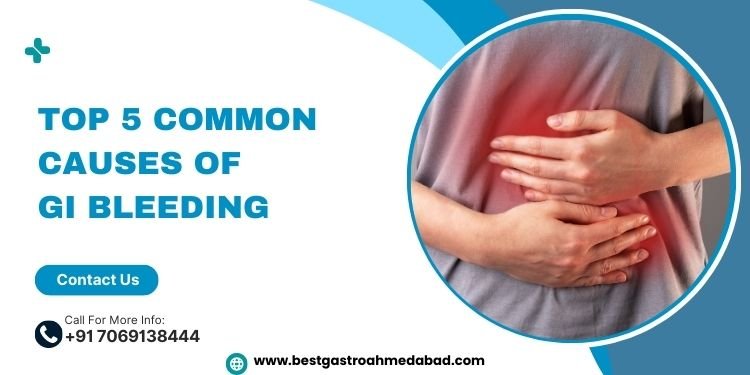Top 5 Common Causes of GI Bleeding | Dr. Vatsal Mehta – Gastroenterologist

Gastrointestinal (GI) bleeding is a common but serious condition that affects many individuals. It can occur in different parts of the digestive tract, and identifying the source is crucial for effective treatment. Here are the top 5 most common causes of GI bleeding you should be aware of:
1. Peptic Ulcers
Peptic ulcers are open sores that develop on the inner lining of the stomach or the upper part of the small intestine. They are often caused by an infection with the bacterium Helicobacter pylori or long-term use of nonsteroidal anti-inflammatory drugs (NSAIDs), such as ibuprofen or aspirin. Peptic ulcers can cause upper GI bleeding, leading to symptoms like black, tarry stools or vomiting blood.
2. Diverticulosis
Diverticulosis refers to small pouches that form in the walls of the colon. These pouches, called diverticula, can sometimes bleed, causing lower GI bleeding. Though not always painful, the bleeding from diverticulosis can be significant, leading to bright red or maroon-colored stool.
3. Hemorrhoids
Hemorrhoids are swollen blood vessels in the rectum or anus. They can cause bleeding during bowel movements, resulting in bright red blood on the toilet paper or in the stool. Although hemorrhoid-related bleeding is usually mild, it can cause discomfort and should be checked by a doctor, especially if it persists.
4. Colon Polyps
Colon polyps are abnormal growths in the colon lining. While most polyps are benign, some can develop into cancer over time. Large polyps may bleed, causing visible or microscopic blood in the stool. Regular screening, such as colonoscopy, is essential for detecting and removing polyps before they become problematic.
5. Inflammatory Bowel Disease (IBD)
Inflammatory Bowel Disease (IBD), including Crohn’s disease and ulcerative colitis, is a chronic condition that causes inflammation of the digestive tract. This inflammation can lead to GI bleeding, abdominal pain, and diarrhea. Early detection and treatment of IBD are crucial for preventing severe complications.
When to Seek Medical Attention
While some cases of GI bleeding may be mild, others can be life-threatening. If you experience symptoms such as vomiting blood, passing black or tarry stools, or feeling dizzy or faint, it is essential to seek immediate medical attention.
Expert Care for GI Bleeding
Dr. Vatsal Mehta, a leading gastroenterologist at Alfa Gastro & Liver Care Hospital in Ahmedabad, specializes in diagnosing and treating GI bleeding. With state-of-the-art facilities and expert knowledge, Dr. Mehta provides personalized care for a wide range of gastrointestinal issues.
Conclusion
Understanding the common causes of GI bleeding can help you take proactive steps toward maintaining your digestive health. If you notice any symptoms of GI bleeding, consult a healthcare professional for timely diagnosis and treatment.
For expert care and consultation, visit Dr. Vatsal Mehta at Alfa Gastro & Liver Care Hospital in Ahmedabad.
